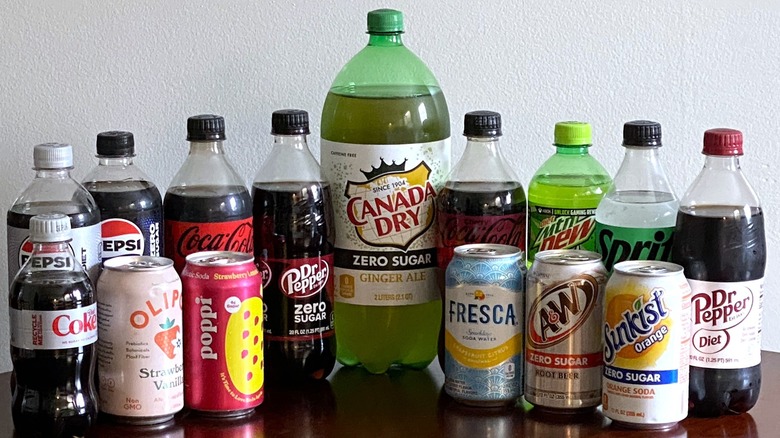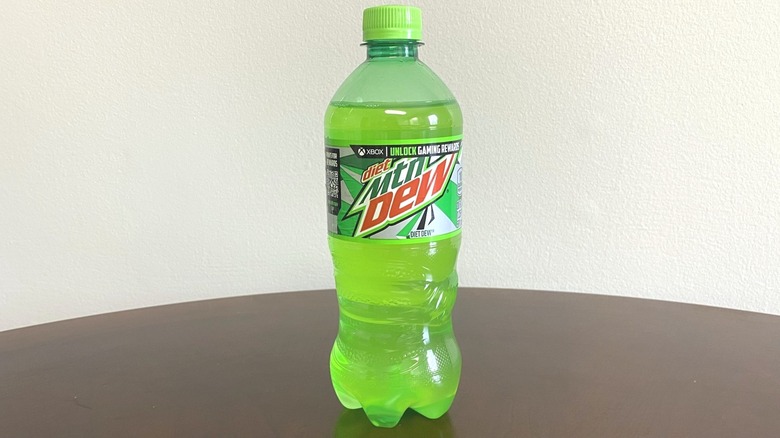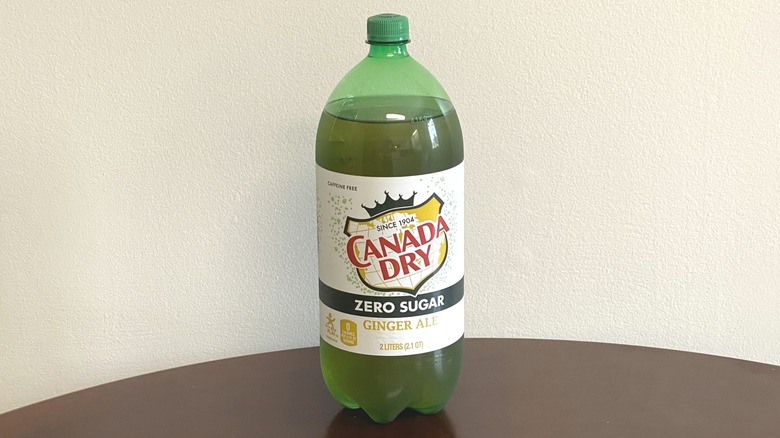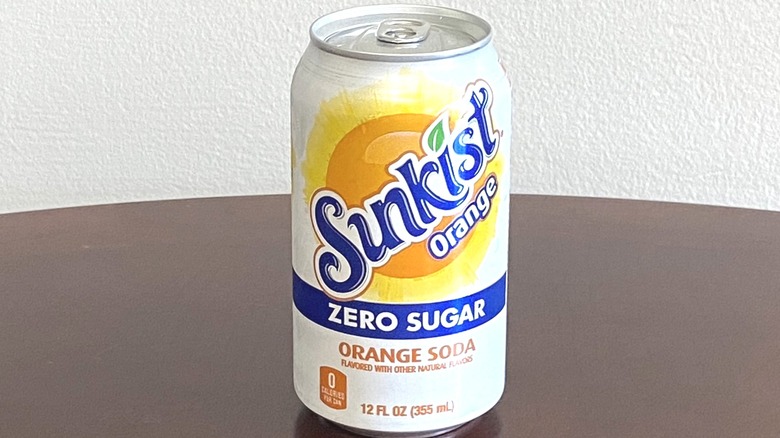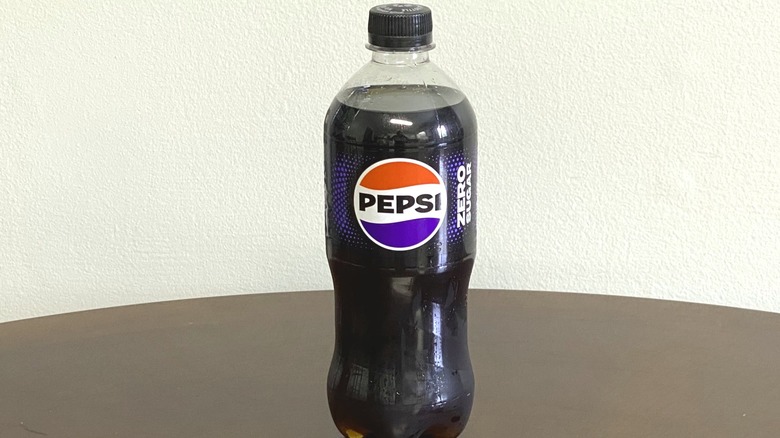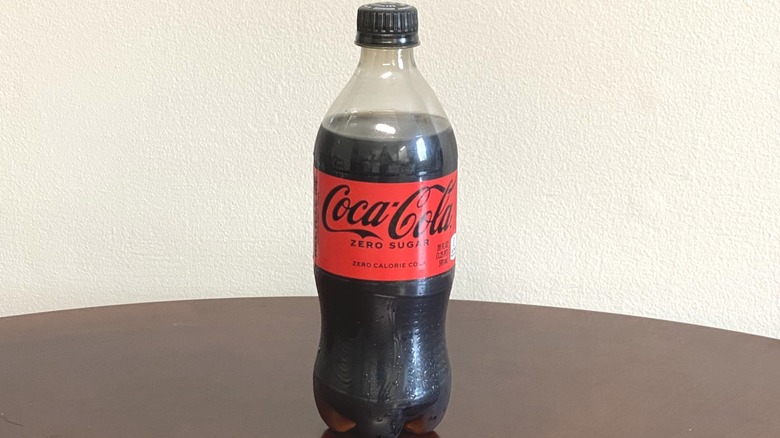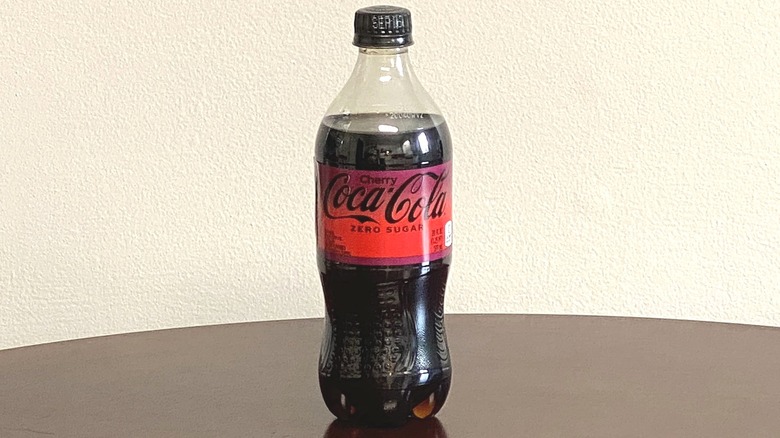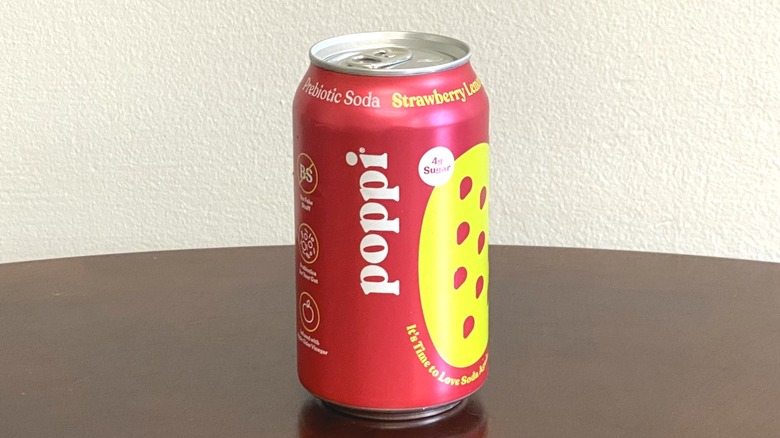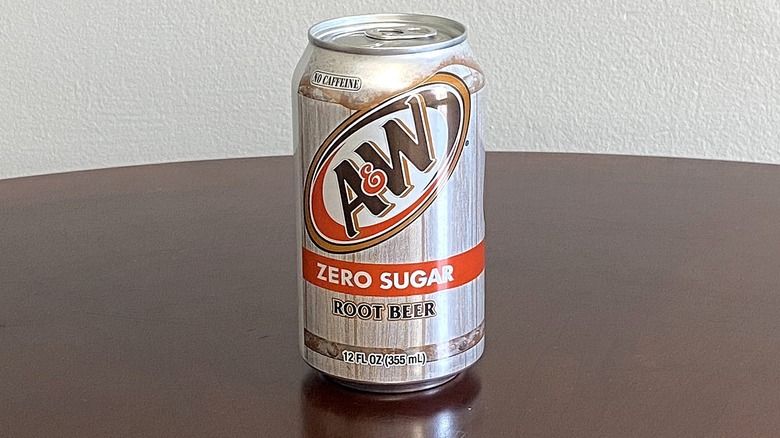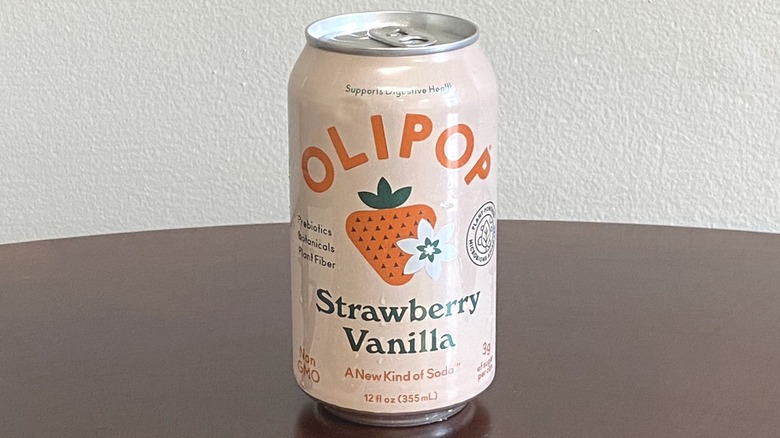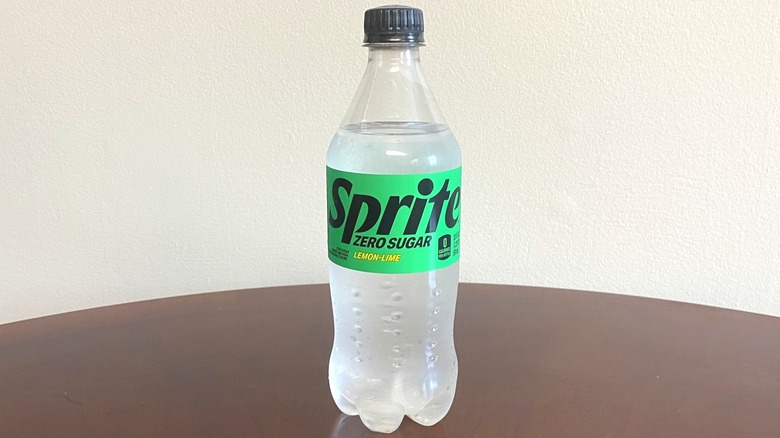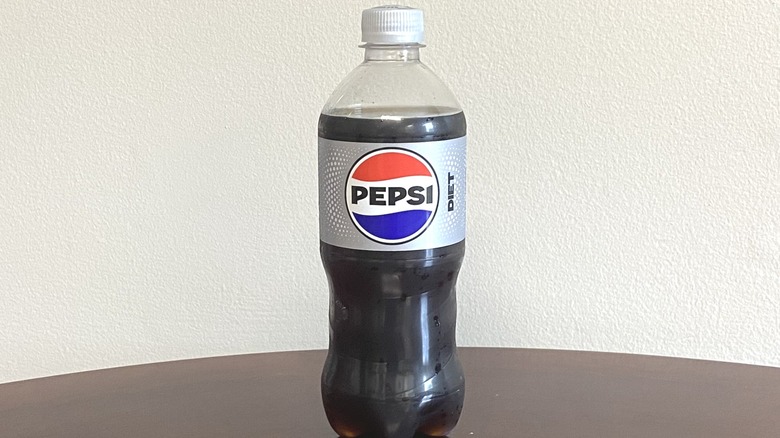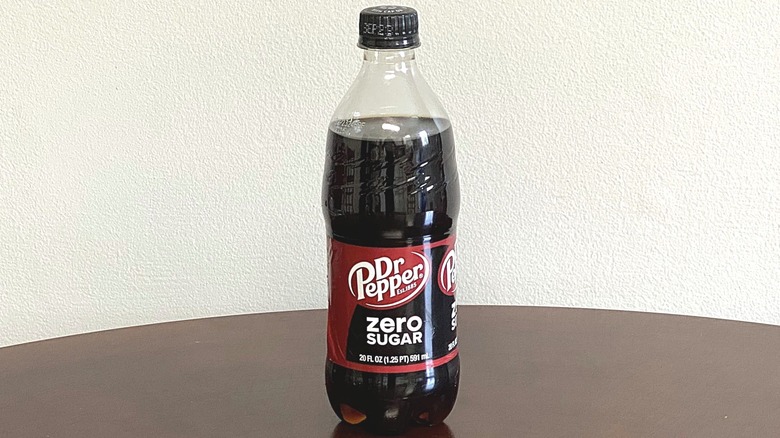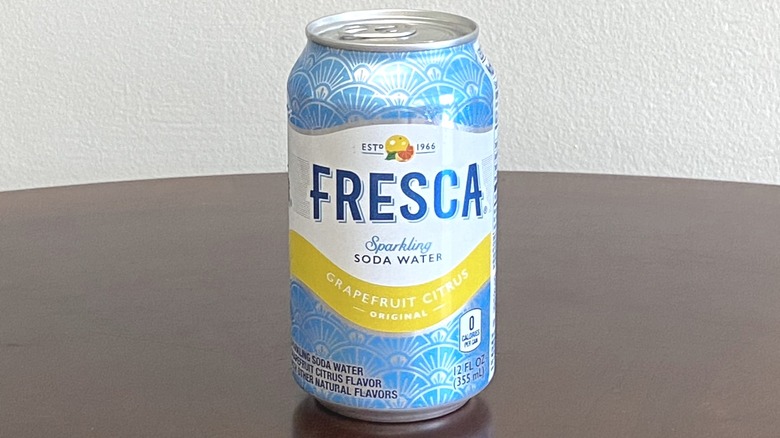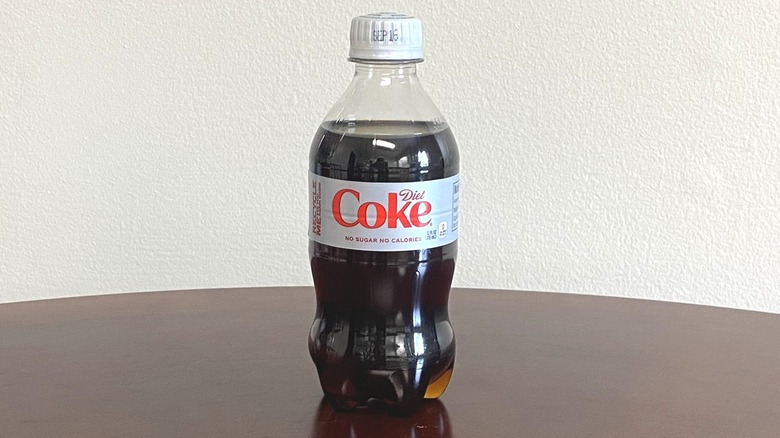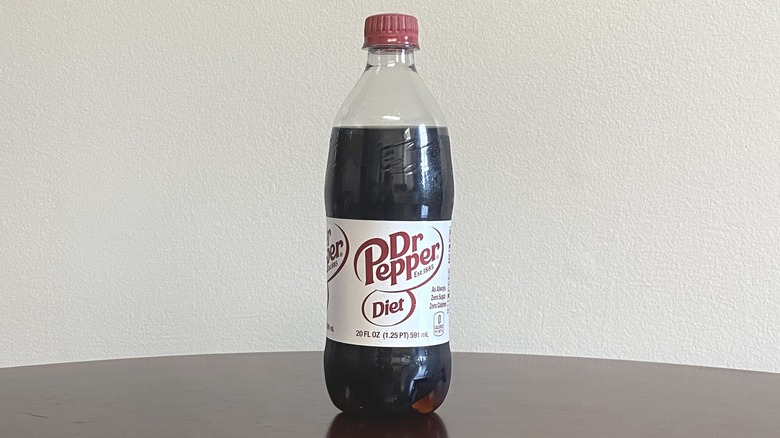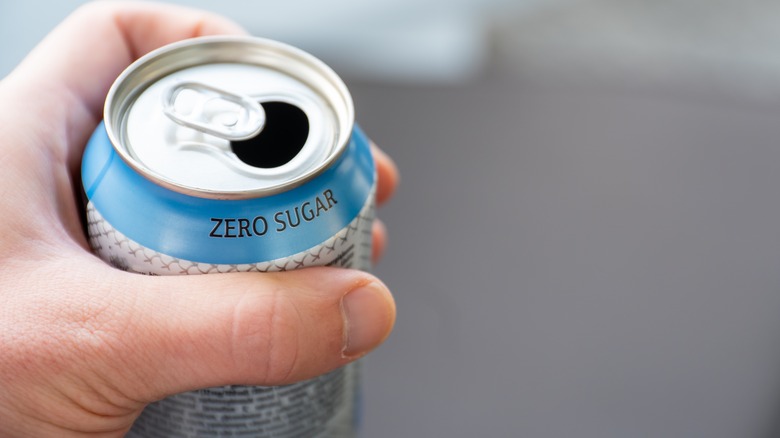15 Popular Diet Sodas, Ranked Worst To Best
Walk through the soda aisle at any supermarket and you might be overwhelmed by the variety of diet sodas available. In addition to classics like Diet Coke and Diet Dr. Pepper, you'll find sugar-free versions of root beers, fruit punches, and more. Now there's prebiotic diet sodas filled with fiber, inulin, and other ingredients.
If you're a seasoned diet soda drinker like myself, you might wonder which of these new cans on the block are worthwhile. I was curious to see how some of these other offerings compare both to each other and to tried-and-true standbys. Then there's the question of "zero" versus "diet" sodas: What's the difference between Diet Coke and Coke Zero? Is one better than the other?
To get a handle on all these questions, I personally taste-tested some of the top diet sodas on the market, using flavor as the main feature. Unless otherwise noted, all of the sodas costs $2.28 per bottle or $7.28 per 12-pack. Here are the results of the flavor adventure I went on through the world of diet sodas. May this help you find your new drink!
15. Diet Mountain Dew
This highly caffeinated soda — at least the regular version — has a pretty serious cult following, especially among Appalachian coal miners who uses the caffeine to stay alert. With acquaintances who raved about Mountain Dew's flavor and productivity-enhancing caffeine content, I cracked open my bottle of the diet version, eager to see what I've been missing. The strong yellowish-green color that's vaguely reminiscent of Hi-C Ecto Cooler from the 1980s, was a bit of a shock. Furthermore, Diet Mountain Dew contains concentrated orange juice, amongst other ingredients, which may have contributed to its 10 calories per 20-ounce bottle.
Once it was poured into a glass, the soda gave off no discernible aroma. I found it not particularly sweet, just vaguely orangey and limey; the flavor faded quickly on my tongue like it never happened. I was left wondering what the point was, and I wouldn't personally add Diet Mountain Dew to my own soda rotation because it did not excite my taste buds in any way. However, if you are fond of Mountain Dew, this diet version may be worth trying.
14. Canada Dry Zero Ginger Ale
The regular version of Canada Dry Ginger Ale originated back in 1904 when its founder, John J. McLaughlin, who was then the owner of a sparkling water plant, aimed to make a lighter ginger ale than the syrup-heavy varieties available at the time. His beverage became a popular mixer during the Prohibition era for its ability to take the edge off the period's rough bathtub gins.
Similar to regular Canada Dry's lightness, the aroma of the zero-sugar version was not particularly strong or gingery, and the first sip revealed a subtle, muted taste that left me disappointed. For a ginger ale, I was expecting more of a gingery kick. That said, I can see this being a great drink mixer at home, just like the flappers of the dry days used its sugary forebear. If you don't care for strongly flavored ginger ales, this one's low-key zing could make it the new beverage to add to your shopping list.
13. Sunkist Zero Sugar
Both Sunkist Orange Soda and its zero-sugar version contain about 19 milligrams of caffeine per 12 fluid ounce serving. That's less than half the amount in a can of Diet Coke, but it's still something to keep in mind if you're considering this classic orange cola as an afternoon treat. Otherwise, it's best to "drink it in the sun," as one of Sunkist's former commercials from the 1980s stated.
Sunkist Zero Sugar gave off a slight orange aroma that was too light a taste and came off a bit underwhelming. The flavor also faded fast on the tongue and left a synthetic-feeling coating, despite the inclusion of natural flavors in the ingredients. That said, Sunkist Zero Sugar seems refreshing. If offered to me, I might accept one on a hot afternoon. It could also be a great beverage to pour over vanilla ice cream for a lower-sugar float.
12. Pepsi Zero
In a longtime battle between Pepsi and Coca-Cola, Pepsi ranked second place to Coke from 2004 to 2023, when Dr. Pepper ousted Pepsi from its position. Still, there are plenty of loyal followers of this soda, which started during the Gilded Age as a drugstore health tonic called Brad's Drink and later renamed as Pepsi-Cola.
The aroma and flavor of Pepsi Zero gave off more Coke than Dr. Pepper vibes. That is, there was a definite tinge of lemony citrus to Pepsi Zero rather than the cherry notes that Dr. Pepper has. Pepsi Zero brought its own thing to the table, though, with a flavor only describable as "lemon toffee caramel" with a sweet, lingering aftertaste. I can see how it has a legion of fans. But while I would drink it in a pinch, I actually preferred Diet Pepsi's flavor to this one as it was just more interesting on my tongue.
11. Coke Zero
Coke Zero was released in 2005 as a healthier option for regular Coca-Cola drinkers, particularly for young male consumers who perceived Diet Coke as too feminine. Coke Zero was actually nicknamed "Bloke Coke" in the U.K. in 2006, highlighting the drink's gender-focused marketing. Then in 2017, it was renamed Coca‑Cola Zero Sugar.
Coke Zero definitely approximates the flavor of Coke more than Diet Coke does; that more intense lemon base is obvious, both in aroma and flavor. If you're a devoted drinker of regular Coke who's looking for a sugar-free switch, you might find this easier on the palate than Diet Coke just because of that similarity to the original. I admit Coke Zero actually grew on me the longer I sipped it. Dare I say that lemony tinge actually feels more refreshing than Diet Coke and Diet Dr. Pepper? I also appreciate Coke's new 100% recycled plastic bottles, highlighting their commitment to reducing waste.
10. Cherry Coke Zero Sugar
Of all the flavored sugar-free varieties that Coca-Cola has graced us with throughout the years, a cherry variety in one formulation or another has been one of the longest-lasting. Diet Cherry Coke came out in the mid-1980s and was replaced with Diet Coke Feisty Cherry in 2018 for a short run before finding its current form as Cherry Coke Zero Sugar.
The soda offered a mild aroma on opening that was more Coke than cherry. The cherry flavor was definitely present, with a nice aftertaste that didn't linger long on the palate. The overall taste was not as intense as I'd expected from my long-ago memories of regular Cherry Coke, but the cherry became more pronounced as the beverage's temperature rose, which I enjoyed. However, the longer I sipped the soda, the more synthetic the cherry flavoring tasted — the same phenomenon I encountered with Sunkist. In the end, I enjoyed this pick, but the gradual artificial tinge to the cherry flavoring keeps it from a higher spot on this list.
9. Poppi Strawberry Lemon Prebiotic Soda
Conventional diet sodas don't typically make health claims beyond their heavy "no sugar" marketing, but Poppi is a new, different breed of soda. With its inclusion of prebiotic fiber, apple cider vinegar, five grams or less of sugar, and 25 or fewer calories, Poppi brands itself as a healthier soda that "safe" for consumers to love. Notably, a class action lawsuit against Poppi was filed in late May 2024 on the grounds that its prebiotic content was too low to have any meaningful impact on health. The general consensus among nutrition professionals is that it's better to get your fiber from whole foods than prebiotic drinks, which may nonetheless be useful as supplements.
The Poppi I tested contained four grams of sugar and 4% juice. As someone who never drinks sugar, including juices, it hit differently than the other sodas, with clear but not overwhelming real-sugar sweetness. The strawberry element gave nice bubblegum-lemonade vibes, but the apple cider vinegar was a bit too noticeable for my tastes. Also, with a price tag of $2.24 per 12-ounce can, you might look into where to buy Poppi soda ingredients to make it yourself.
8. A&W Root Beer Zero
In the battle between A&W and Barq's root beers, Barq's tends to win for palates that prefer a sharp, heavy bite to their root beer, while A&W excels for those who like a creamy, milder flavor. The zero-sugar variety of Barq's is a rare sight in my neck of the woods, while A&W Root Beer Zero is readily available.
I didn't realize A&W has a milder flavor profile until I tried my first sip and wondered who forgot to add the root beer to the drink. As I continued to sip, the beverage's creamy notes grew on me despite the initially disappointing lack of deep, dark rootiness. Though it's a more toned-down root beer, the flavor lingered a while on the palate after drinking it, and the aftertaste was pleasant enough. I also appreciated the fact that there's no caffeine, making it a suitable evening sip.
That said, this root beer could feel a little too dessert-like in the middle of the day for me and wouldn't be my personal choice as a grab-it-anytime drink, but it has its merits. That sweet creaminess might also be worth trying out as a root beer to upgrade your canned baked beans.
7. Olipop Strawberry Vanilla
Like Poppi, Olipop is a relatively new prebiotic soda with a notable quantity of dietary fiber and less sugar than conventional sodas. There was a wide variety of Olipop flavors to choose from, so I opted for the Strawberry Vanilla to get as close a comparison as possible to the Strawberry Lemon Poppi I tested.
When poured,the Olipop Strawberry Vanilla featured an attractive pink color, almost like rosé wine. The strawberry aroma was appealing and the flavor sweet and lightly decadent. Like Poppi, the real sugar took my taste buds to new places that they enjoyed, and there was no unpleasant lingering aftertaste. In fact, I enjoyed the taste of Olipop more than I did Poppi, perhaps because of the lack of apple cider vinegar.
That said, there were nine grams of fiber in my can, suggesting that this may not be a drink that you'd want to consume in epic quantities, especially if you're already consuming your daily recommended amount of fiber. Furthermore, a can is normally priced is $2.38 (I got mine on sale for $1.97) and a four-pack of 12-ounce cans goes for nearly $9. That makes this, like Poppi, pricier than conventional sugar-free sodas. Because of this, I wouldn't be adding this to my cart every week.
6. Sprite Zero
Sprite launched in 1961 and has been going on strong ever since, with 8.1% of the market shares among U.S. soft drinks in 2023. The zero-sugar version's label was revamped in 2023 to include bold black font, explaining part of my surprise that the beverage didn't look the way I remembered all my life. Then there's the fact that Sprite no longer uses green bottles to better facilitate recycling (kudos to them!). With these changes, I was curious how the flavor of Sprite Zero would play out.
Sprite Zero had a fairly strong lemon-lime scent and a moderately sweet flavor that hit neither overwhelmingly strong nor disappointingly weak. The flavor faded fast on the tongue but left a little zing of lemon that was nice. I can see this being very refreshing on a hot day, and there's no caffeine, so it's good any time. Plus, like the regular version, Sprite Zero's tasty, mild flavor would make it a good mixer. Overall, it's a solid drink.
5. Diet Pepsi
My experience taste-testing Diet Pepsi led to one of the biggest beverage surprises I've had in a long while. I'm not a Pepsi drinker at all, so my first sip had me scrambling to think of how to describe Diet Pepsi's hard-hitting opening note. "Syrupy" was my first thought, as it was certainly sweeter than any other soda I tested, and the flavor lingered quite a while on the palate.
With more sips, the flavor took on an almost medicinal tone, but not in a bad way. I detected tinges of caramel, vanilla, citrus, and perhaps a tad of ginger. In the end, I stopped worrying about how to define the taste and just focused on how I felt about it. Diet Pepsi was a very enjoyable experience. It was just a little too strongly flavored to be something I'd buy a case of, but it would make for a great sweet treat.
4. Dr. Pepper Zero Sugar
The product descriptions on Dr. Pepper's website imply that Dr. Pepper Zero Sugar is a sugar-free version of the regular product, while Diet Dr. Pepper is a calorie-free purveyor of regular Dr. Pepper's flavor profile. So was the difference between the two a "no calories versus no sugar" marketing thing? My own taste buds would decide.
Dr. Pepper Zero had much less of an aroma than Diet Dr. Pepper. However, the flavor packed a shocking punch. It was similar to its Diet sibling's taste but amplified, lighting up my entire mouth with pure Dr. Pepperiness. With this test, it's clear that Zero is just what its name implies — a zero sugar alternative that would probably work beautifully in recipes like the Dr. Pepper pickles drink. However, I'm so used to Diet Dr. Pepper that Dr. Pepper Zero was a bit intense. This product is better suited for someone seeking an alternative to the regular soda.
3. Fresca
Fresca has been around since the mid-1960s and was actually Coca-Cola's second ever diet soda, coming in after Tab. The packaging is a subtle icy sky blue and lemon-yellow accents, and the drink doesn't seem to get the amount of marketing attention that its Coca-Cola cousins receive. In other words, Fresca is an underdog with a pedigree, and I was keen to know if the lack of fuss is related to flavor.
Fresca poured out a bit cloudy, just as you'd expect from a drink made with concentrated grapefruit juice. In terms of flavor, Fresca more than lived up to its name, which means "fresh" in several languages, including Spanish, Italian, and Portuguese: It was incredibly refreshing and tasty, and I had to stop myself from chugging. It was sweeter than Sprite Zero, though more natural tasting, with a pleasant hint of tartness from the grapefruit. It's caffeine-free, too. I want a case of this in my house at all times!
2. Diet Coke
Diet Coke originated in the early 1980s, and its position in today's soda-drinking world makes it hard to believe that Coca-Cola's decision-makers at the time feared it might not perform as well as Tab. Due to its underperforming sales, Tab ultimately didn't survive, a fate impossible to imagine for Diet Coke, one of Coca-Cola's top four brands.
The flavor is crisp, refreshing, and vaguely lemony, which is unsurprising considering regular Coke's probable inclusion of citrus as one of its flavors (the exact recipe is still a trade secret). While I'm not a fan of regular Coke, Diet Coke works for me. It's a very inoffensive beverage, avoiding extremes. This makes it a good mixer and the type of drink that makes sense with breakfast, lunch, dinner, or even after dinner if caffeine isn't an issue. Biases aside, I was open to ranking it lower, but my taste buds wouldn't allow it.
1. Diet Dr. Pepper
Despite Dr. Pepper Zero's masterful impersonation of the regular Doctor, Diet Dr. Pepper came out as the overall winner. While part of this assessment is inevitably driven by my own experience with the cola, I went into this experiment ready to displace Diet Dr. Pepper from its top position among my preferences. That didn't happen. I did, however, discover the words to express why Diet Dr. Pepper is the winner.
While the cherry aroma of Diet Dr. Pepper is far stronger than that of Dr. Pepper Zero, when the flavor kicks in, something wild happens: Diet Dr. Pepper takes a step back. It's still got the signature cherry base, but a lighter take on it. On the other hand, Zero was just too sweet and strongly flavored for an "anytime" drink, which is exactly what Diet Dr. Pepper is — a balanced beverage that works both when you want a flavorful drink and when you want a quiet drink.
Methodology
In the process of choosing the diet sodas for this taste test, I wanted both brands that are marketed based on a flavoring (such as Sunkist) and sodas such as Diet Coke, which retain a proprietary flavor profile. The final 15 were picked for being either common diet soda drinks (e.g. the Coca-Cola, Dr. Pepper, and Pepsi offerings), sugar-free versions in a flavor niche (e.g. A&W Root Beer Zero or Diet Mountain Dew), or popular new health-based soda alternatives.
When it comes to ranking, I was the sole taste-tester, and the sodas were all consumed cold from a glass with no ice. I noted any aromas before sipping and tested each drink over the course of half an hour to gauge changes in flavor, watching for synthetic lingering aftertastes that are a common criticism of some diet sodas.
The majority of the sodas fell into the same price range, so cost was only a consideration for ranking in cases where a beverage was significantly more expensive than the others — namely, the two prebiotic sodas. Ultimately, while the best diet soda is subjective, the top pick was the one with a pleasant flavor that fit most occasions and which was worth its price tag.
